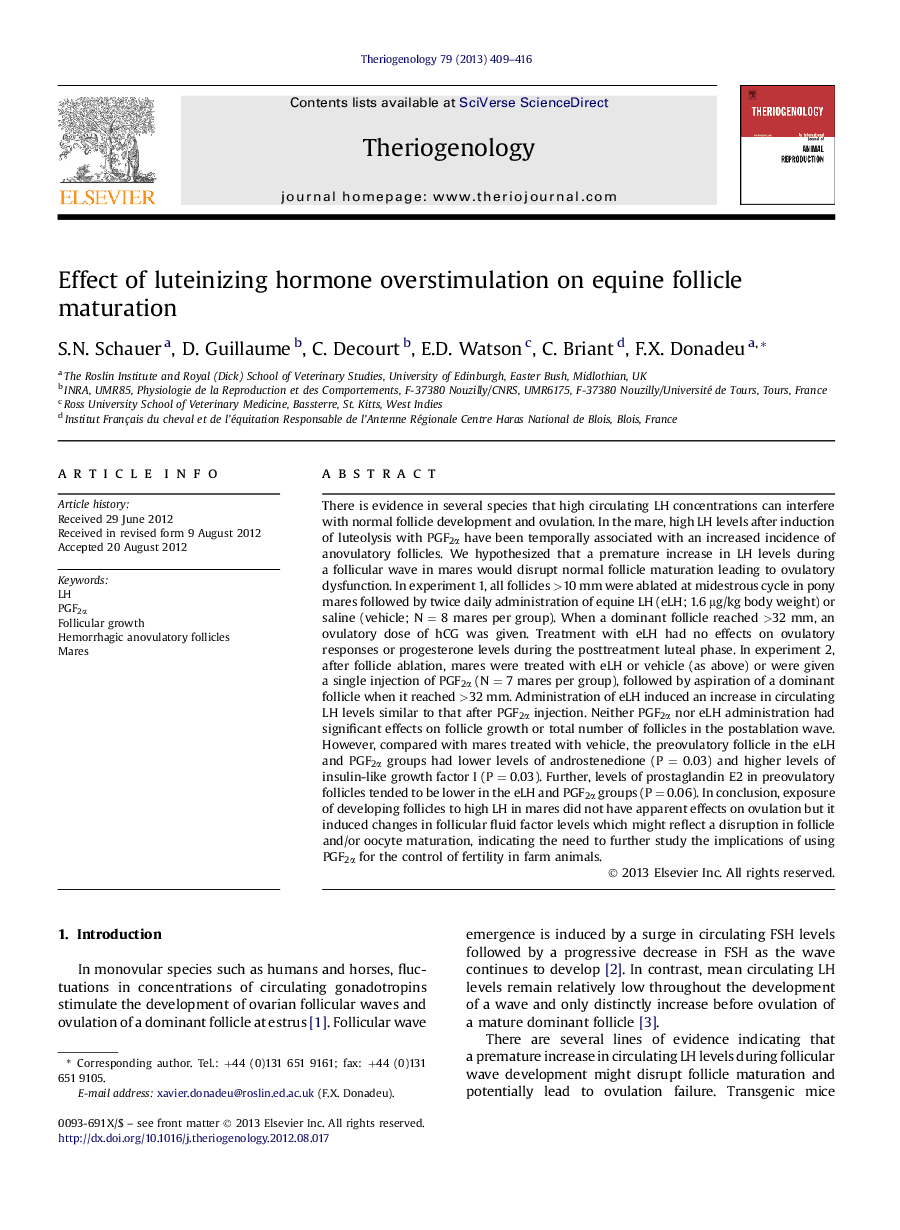| کد مقاله | کد نشریه | سال انتشار | مقاله انگلیسی | نسخه تمام متن |
|---|---|---|---|---|
| 10892079 | 1082088 | 2013 | 8 صفحه PDF | دانلود رایگان |
عنوان انگلیسی مقاله ISI
Effect of luteinizing hormone overstimulation on equine follicle maturation
ترجمه فارسی عنوان
تأثیر غلظت بیش از حد هورمون لوتئینیزه بر بلوغ فولیکول اسب
دانلود مقاله + سفارش ترجمه
دانلود مقاله ISI انگلیسی
رایگان برای ایرانیان
موضوعات مرتبط
علوم زیستی و بیوفناوری
علوم کشاورزی و بیولوژیک
علوم دامی و جانورشناسی
چکیده انگلیسی
There is evidence in several species that high circulating LH concentrations can interfere with normal follicle development and ovulation. In the mare, high LH levels after induction of luteolysis with PGF2α have been temporally associated with an increased incidence of anovulatory follicles. We hypothesized that a premature increase in LH levels during a follicular wave in mares would disrupt normal follicle maturation leading to ovulatory dysfunction. In experiment 1, all follicles >10 mm were ablated at midestrous cycle in pony mares followed by twice daily administration of equine LH (eLH; 1.6 μg/kg body weight) or saline (vehicle; N = 8 mares per group). When a dominant follicle reached >32 mm, an ovulatory dose of hCG was given. Treatment with eLH had no effects on ovulatory responses or progesterone levels during the posttreatment luteal phase. In experiment 2, after follicle ablation, mares were treated with eLH or vehicle (as above) or were given a single injection of PGF2α (N = 7 mares per group), followed by aspiration of a dominant follicle when it reached >32 mm. Administration of eLH induced an increase in circulating LH levels similar to that after PGF2α injection. Neither PGF2α nor eLH administration had significant effects on follicle growth or total number of follicles in the postablation wave. However, compared with mares treated with vehicle, the preovulatory follicle in the eLH and PGF2α groups had lower levels of androstenedione (P = 0.03) and higher levels of insulin-like growth factor I (P = 0.03). Further, levels of prostaglandin E2 in preovulatory follicles tended to be lower in the eLH and PGF2α groups (P = 0.06). In conclusion, exposure of developing follicles to high LH in mares did not have apparent effects on ovulation but it induced changes in follicular fluid factor levels which might reflect a disruption in follicle and/or oocyte maturation, indicating the need to further study the implications of using PGF2α for the control of fertility in farm animals.
ناشر
Database: Elsevier - ScienceDirect (ساینس دایرکت)
Journal: Theriogenology - Volume 79, Issue 3, February 2013, Pages 409-416
Journal: Theriogenology - Volume 79, Issue 3, February 2013, Pages 409-416
نویسندگان
S.N. Schauer, D. Guillaume, C. Decourt, E.D. Watson, C. Briant, F.X. Donadeu,
